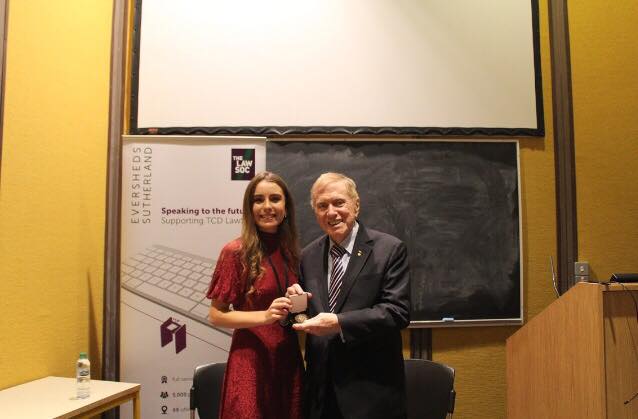Former Australian High Court Justice Michael Kirby visited Lawsoc on Thursday evening to receive the Praeses Elit award, which is given to individuals who have excelled in their respective fields. With notable guests Senator David Norris, the Australian ambassador to Ireland, and Former Supreme Court Justice Mary Laffoy in attendance, this was the first event in Lawsoc’s speaker series of 2020.
Kirby has staunchly campaigned for LGBTQI rights, chaired an inquiry into human rights abuses in North Korea, and advocated for essential healthcare. Following an introduction from Lawsoc auditor Milly Farrell Kelly, Kirby began the evening by recalling a memory of receiving a copy of the UN Declaration of Human Rights printed on airmail paper in primary school in Sydney, Australia. “To be given that kind of instruction is something I never forgot,” he remarked. Kirby followed on by speaking about his time as a student politician in university. He encouraged the student politicians in Trinity to continue “causing trouble”, advising them that “it’s important to be a student trouble maker.”
Kirby recalled standing up for human rights during his time at university, including a specific example regarding aboriginal rights. However, he noted, despite the many issues of human rights abuses that were discussed, LGBTQI individuals were “unmentionable”. When asked if he thought LGTBQI rights would always have to be guarded, Kirby stated that it is important to recognise what has been done while noting the countries which are behind. Kirby cited two recent cases in Zambia in the last month which show successes in the area of LGBTQI rights. When asked if his experience of being openly gay on the Australian high court affected his experience on the judiciary, Kirby replied that he and his partner felt they owed it to the younger generation to be true to themselves. “[We felt that] If we can’t stand up, no one can.” He criticised closeted gay individuals in the legal circuit in Australia who have not chosen to come out publicly and said that they need to “get over it, have an apsirin, have a lie down and get over it”, stating that nothing will change unless people are encouraged by others.
The issue of global access to healthcare arose as Kirby was asked if he thought the law has a part to play in its implementation. He spoke of how the constitutional framework of each jurisdiction will define how the issue is dealt with. He also mentioned the coronavirus and said that matters must be dealt with on an international level, we are no longer living in our jurisdiction, and lawyers need to appreciate the role of the UN.
Another question was asked regarding how human rights can be protected in a country guarded from third party intervention. Drawing from his time in North Korea, Kirby spoke about how nuclear weapons have developed more quickly than anyone expected. He also spoke of how North Korea shuts down any conversation about human rights and how it will not change unless the issues are dealt with, calling this a top global priority.
Kirby gave some advice to aspiring human rights lawyers, stating that it is important for a human rights lawyer to be a good one, and that gaining expertise in more technical areas of the law such as tax or administrative law will aid practice. “People who are all heart but no skill are a menace.” He also recommended working as a UN Volunteer in Geneva and New York. Kirby was also asked if the role of the UN Security Council should be reformed and said that this is unlikely and will not happen without the approval of the five permanent members of the security council: France, China, Russia, the UK and the US.
Questions from students were asked in regard to wrongful pregnancy cases in Australia and whether the makeup of the judiciary should be merit based or diversity based. On the latter question, Kirby mentioned work he had done with the Asian Australian lawyers association and its positive effects. He also said that he finds defining merit to be troublesome and that it cannot be equated to getting good grades in law school or handling a corporate insolvency well but is based on talent.
Speaking of his personal family ties to Ireland, Kirby talked about how proud he was to come back to receive the award and thanked the students for their “high intelligence and good taste.”






